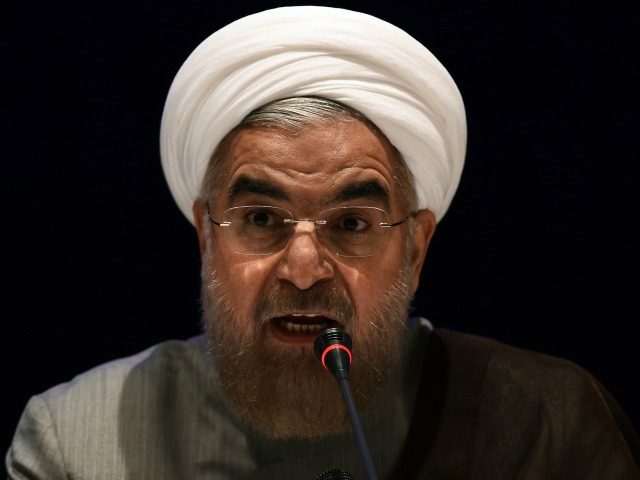Hassan Rouhani, the president of Iran, warned his Azerbaijani counterpart Ilham Aliyev in a phone call Tuesday to keep “terror groups” out of the nation’s conflict with Armenia, a concern as reports mount of Azeri ally Turkey importing Syrian mercenaries to the battle theater.
Rouhani warned in remarks in Tehran on Wednesday that any escalation in the Caucasus conflict – which erupted in late September following decades of disagreement over the possession of Nagorno-Karabakh, an ethnic Armenian territory – could result in a greater regional war.
Soviet mass murderer Joseph Stalin placed Nagorno-Karabakh in the Azeri Soviet Socialist Republic during his tenure, despite the lack of historical context to strip it from Armenia. Following the collapse of the Soviet Union in the 1990s, Azerbaijan and local troops found a war that resulted in tens of thousands of deaths in the region and the establishment of the unrecognized “Republic of Artsakh” in Nagorno-Karabakh.
Both Armenia and Azerbaijan claim the other side triggered the current conflict. Following its eruption, the government of Islamist Turkish President Recep Tayyip Erdogan announced it would act if Azerbaijan requested support. Multiple reports, including one revealed by French President Emmanuel Macron, indicate that Turkey is flying Syrian fighters into Nagorno-Karabakh to oppose the Armenians. Armenia has accused Turkey of attempting to “continue” the 1915 Armenian Genocide.
Amnesty International revealed this week it had evidence that Azerbaijan is using banned cluster bomb munitions, notorious for the widespread killing of civilians, in Nagorno-Karabakh.
While Azerbaijan is majority-Muslim and enjoys friendly relations with Tehran, Iran is also allied to Christian-majority Armenia, as Armenia and Iranian ally Russia enjoy close ties. The Kremlin clarified in a statement Wednesday that it has no intention to intervene in Nagorno-Karabakh, although it is treaty-bound to defend Armenia, because Nagorno-Karabakh is not legally part of Armenia. Russia may intervene if fighting occurs within Armenia’s borders.
In his conversation with Aliyev, according to Iranian state outlet PressTV, Rouhani emphasized Iranian concerns about the Syrian jihadists that Erdogan is allegedly importing to the Caucasus. Iran is a vocal supporter of Syrian dictator Bashar al-Assad; Erdogan has invested in Syrian Sunni jihadist groups in an attempt to overthrow him.
“Security, stability and peace in the region, particularly on the [Iran’s] northern borders, are highly important to us,” Rouhani reportedly said. “This conflict and the continuation of border insecurity should not prepare the ground for the infiltration of some terror groups [in the region].”
Aliyev reportedly responded with a vow not to allow the Nagorno-Karabakh conflict to spill over into other countries.
Rouhani again expressed concern over Syrian terrorists infiltrating the Caucasus conflict during remarks at a cabinet meeting one Wednesday.
“Iran does not allow some parties to transfer the terrorists that we have fought for long years in Syria and annihilated them to our bordering areas,” he said, according to the state-run Fars News Agency, without naming Turkey. “This is unacceptable and we have clearly said it to the officials of the neighboring states.”
“President Rouhani also warned against turning the Azerbaijan-Armenia war into a regional war, saying that the countries which add fuel to this fire should know that continued war will benefit no one and the war should end via political means,” Fars added.
Iran has bristled at the conflict more vocally following reports in the nation’s media that the warring sides accidentally fired into Iranian territory this week. Deputy Commander of Iran’s Law Enforcement Police Brigadier General Qassem Rezayee issued a warning to both sides on Wednesday to beware of accidentally targeting Iran. Rezayee also claimed that both Armenia and Azerbaijan have accepted responsibility for shelling in Iran and apologized for it.
“They have promised not to repeat such incidents,” he added.
Iran reportedly increased security on its border this week to protect the rural areas closer to both countries.
Macron warned that French intelligence suggested the presence of Syrian jihadists in Nagorno-Karabakh to fight the Armenian native population last week, following warnings from the Armenian government that Turkey had moved as many as 4,000 mercenaries into the area to fight the Nagorno-Karabakh forces. Multiple international news agencies have published interviews with men claiming to be part of this mercenary force, most saying they are not jihadists but civilians who Turkish government affiliates, sometimes private companies, offered as much as $2000 a month to go to Azerbaijan for a job as a “guard.” The fighters have said that, at the time the jobs were offered, there was no conflict in the region, so they had no way of knowing they were going to war.
“Imagine Caucasus becoming another Syria?” Armenian President Armen Sarkissian asked in a CNBC interview last week. “The international community has to realize that if you don’t interfere now, then Caucasus will become another huge problem.”
Sarkissian complained that the Turks “are creating problems everywhere … [they] have [problems 360 degrees around them.”
On Wednesday, Armenian Prime Minister Nikol Pashinyan called the regional conflict a “struggle against international terrorism” now that jihadist groups were allegedly present.
“Firstly, Turkey has become fully engaged, encouraging, and inciting the conflict. Turkey has also transported mercenaries and terrorists from the territory of Syria to the conflict zone which is changing the whole context,” Pashinyan reportedly told the U.K.’s Sky News.
Azerbaijan has denied the allegations, claiming that its military is far more powerful than Nagorno-Karabakh’s and does not need outside help. On Wednesday, Azeri officials told the Russian news agency TASS not that there were no Syrians in the region, but that, specifically, “no terrorists from the Nusra Front and Sultan Murad [jihadist] groups” are in Azerbaijan fighting.
Turkey’s state media, along with Azerbaijan, has accused Armenia of being the country importing mercenaries. Reports indicate that Greeks, ethnic Armenians, and ethnic Yazidis from around the region have mobilized in small numbers to protect Nagorno-Karabakh.

COMMENTS
Please let us know if you're having issues with commenting.